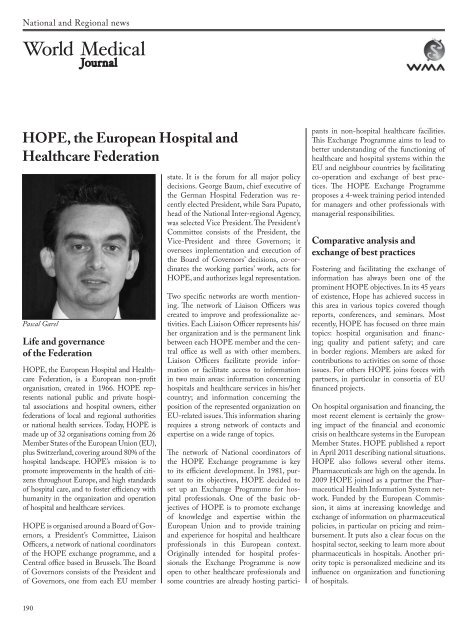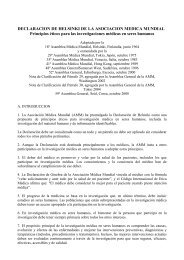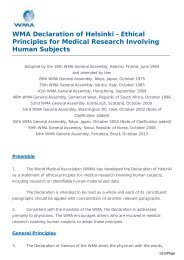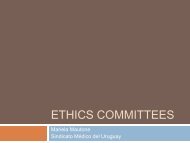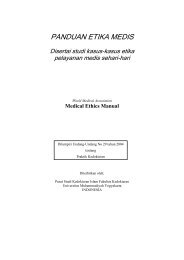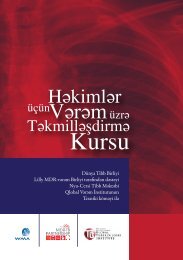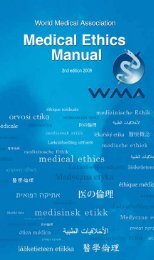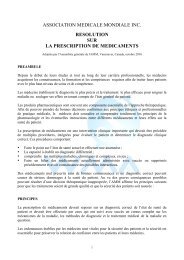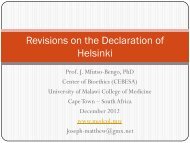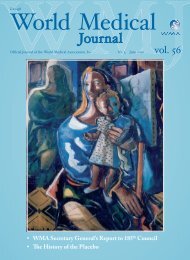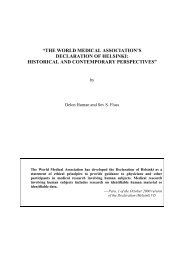WMJ 05 2011 - World Medical Association
WMJ 05 2011 - World Medical Association
WMJ 05 2011 - World Medical Association
Create successful ePaper yourself
Turn your PDF publications into a flip-book with our unique Google optimized e-Paper software.
National and Regional news<br />
HOPE, the European Hospital and<br />
Healthcare Federation<br />
Pascal Garel<br />
Life and governance<br />
of the Federation<br />
HOPE, the European Hospital and Healthcare<br />
Federation, is a European non-profit<br />
organisation, created in 1966. HOPE represents<br />
national public and private hospital<br />
associations and hospital owners, either<br />
federations of local and regional authorities<br />
or national health services. Today, HOPE is<br />
made up of 32 organisations coming from 26<br />
Member States of the European Union (EU),<br />
plus Switzerland, covering around 80% of the<br />
hospital landscape. HOPE’s mission is to<br />
promote improvements in the health of citizens<br />
throughout Europe, and high standards<br />
of hospital care, and to foster efficiency with<br />
humanity in the organization and operation<br />
of hospital and healthcare services.<br />
HOPE is organised around a Board of Governors,<br />
a President’s Committee, Liaison<br />
Officers, a network of national coordinators<br />
of the HOPE exchange programme, and a<br />
Central office based in Brussels. The Board<br />
of Governors consists of the President and<br />
of Governors, one from each EU member<br />
state. It is the forum for all major policy<br />
decisions. George Baum, chief executive of<br />
the German Hospital Federation was recently<br />
elected President, while Sara Pupato,<br />
head of the National Inter-regional Agency,<br />
was selected Vice President. The President’s<br />
Committee consists of the President, the<br />
Vice-President and three Governors; it<br />
oversees implementation and execution of<br />
the Board of Governors’ decisions, co-ordinates<br />
the working parties’ work, acts for<br />
HOPE, and authorizes legal representation.<br />
Two specific networks are worth mentioning.<br />
The network of Liaison Officers was<br />
created to improve and professionalize activities.<br />
Each Liaison Officer represents his/<br />
her organization and is the permanent link<br />
between each HOPE member and the central<br />
office as well as with other members.<br />
Liaison Officers facilitate provide information<br />
or facilitate access to information<br />
in two main areas: information concerning<br />
hospitals and healthcare services in his/her<br />
country; and information concerning the<br />
position of the represented organization on<br />
EU-related issues. This information sharing<br />
requires a strong network of contacts and<br />
expertise on a wide range of topics.<br />
The network of National coordinators of<br />
the HOPE Exchange programme is key<br />
to its efficient development. In 1981, pursuant<br />
to its objectives, HOPE decided to<br />
set up an Exchange Programme for hospital<br />
professionals. One of the basic objectives<br />
of HOPE is to promote exchange<br />
of knowledge and expertise within the<br />
European Union and to provide training<br />
and experience for hospital and healthcare<br />
professionals in this European context.<br />
Originally intended for hospital professionals<br />
the Exchange Programme is now<br />
open to other healthcare professionals and<br />
some countries are already hosting participants<br />
in non-hospital healthcare facilities.<br />
This Exchange Programme aims to lead to<br />
better understanding of the functioning of<br />
healthcare and hospital systems within the<br />
EU and neighbour countries by facilitating<br />
co-operation and exchange of best practices.<br />
The HOPE Exchange Programme<br />
proposes a 4-week training period intended<br />
for managers and other professionals with<br />
managerial responsibilities.<br />
Comparative analysis and<br />
exchange of best practices<br />
Fostering and facilitating the exchange of<br />
information has always been one of the<br />
prominent HOPE objectives. In its 45 years<br />
of existence, Hope has achieved success in<br />
this area in various topics covered though<br />
reports, conferences, and seminars. Most<br />
recently, HOPE has focused on three main<br />
topics: hospital organisation and financing;<br />
quality and patient safety; and care<br />
in border regions. Members are asked for<br />
contributions to activities on some of those<br />
issues. For others HOPE joins forces with<br />
partners, in particular in consortia of EU<br />
financed projects.<br />
On hospital organisation and financing, the<br />
most recent element is certainly the growing<br />
impact of the financial and economic<br />
crisis on healthcare systems in the European<br />
Member States. HOPE published a report<br />
in April <strong>2011</strong> describing national situations.<br />
HOPE also follows several other items.<br />
Pharmaceuticals are high on the agenda. In<br />
2009 HOPE joined as a partner the Pharmaceutical<br />
Health Information System network.<br />
Funded by the European Commission,<br />
it aims at increasing knowledge and<br />
exchange of information on pharmaceutical<br />
policies, in particular on pricing and reimbursement.<br />
It puts also a clear focus on the<br />
hospital sector, seeking to learn more about<br />
pharmaceuticals in hospitals. Another priority<br />
topic is personalized medicine and its<br />
influence on organization and functioning<br />
of hospitals.<br />
190


